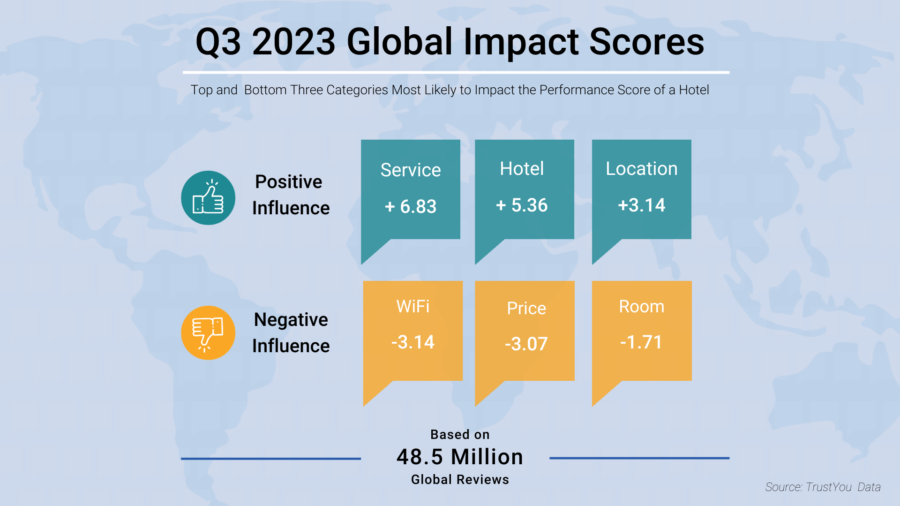In this blog, we analyze three key hospitality trends for 2024 and look at the excitement, challenges, and fears that they may bring along the way.
The end of the year brings an opportunity to reflect on what’s coming next and what trends may impact the hospitality industry.
Change, disruption, and innovation are often mentioned when describing the impact of technology, evolving consumer behaviors, and the ever-complex economic and political scene. While these buzzwords often come with a feeling of excitement and progress, the path toward integrating these trends efficiently often comes with a certain degree of uncertainty mixed with operational challenges.
#1 Hospitality Tech: Balancing Efficiency and Emotion
Rapid technological changes are causing radical transformations in all industries, and the hospitality sector is no exception. More efficient operations, streamlined services, and seamless customer experiences are among the key benefits technology brings to the hoteliers’ table.
While the possibilities seem unlimited, many hoteliers have mixed feelings about existing technology solutions.
A recent study by Deloitte explored how hotels and airports are employing current technologies to reduce staff shortages and streamline operations. Unsurprisingly, the results show hoteliers need more convincing that technology solves all their challenges. For example, only 1 out of 4 hoteliers believe AI can significantly improve guest processing, compared to 100% of airport tech leaders.
54% of hoteliers believe that the available technology is not sufficiently advanced to meet their ever-evolving requirements.
A more reluctant approach comes from the uncertainty that technology can cater to the needs of an industry that has to combine operational excellence with human touch and emotions. Finding the sweet spot between automation, digitization, and genuine connection is the ultimate challenge to ensure efficiency on one side and happiness on the other.
#2 Traveling Cheaper or Greener?
Sustainability has become more than a buzzword in the industry, and many hospitality providers go the extra mile to implement eco-friendly initiatives.
Travelers are also more conscious than before: a recent study by Booking.com shows that almost 8 out of 10 respondents would like to adopt more sustainable practices in their trips. This equals the same number of people saying their travel budgets have been affected by rising costs.
Our data also confirms the role that price plays when leaving a review. Based on our quarterly research for 2023, globally, WiFi is the only category that can bring lower scores, except for price. The value of money is not just a criterion for choosing accommodation. It can also significantly impact how guests evaluate their stay.

There is a middle ground between “cost and conscience” that would allow for more green travel in the future. 49% of consumers are more willing to book eco-friendly activities and places if they come with discounts or economic incentives. Taking individual action is one of the preferred ways for travelers to make a difference. For example, 67% of those participating in the survey said they turn off the AC when leaving the accommodation, 29% more than in 2022. Hotels can encourage small initiatives that can be easily adopted by guests inside and outside of the accommodation.
#3 Where Data Meets Personalization
Modern travelers desire personalized experiences that go beyond the standard offerings. They want to feel special and have their preferences accounted for before, during, and after their stay. Personalization creates a sense of exclusivity, enhances guest satisfaction, and fosters loyalty.
To meet this demand, hospitality businesses are adopting customer-centric approaches, leveraging data and technology.
The first step to providing a personalized experience is understanding your guests’ behavior, what makes them happy, and what causes dissatisfaction. However, having access to a database with valuable information is insufficient to understand patterns and connect various indicators. Tech solutions should provide the opportunity to treat data in the most flexible and dynamic way, like building blocks that can be used to explain different patterns and situations. This customization level is essential for deep-diving and understanding what brings guest satisfaction. Beyond this, it can also give critical insights into optimizing operations and revenue.
Other factors can foster a flexible and dynamic approach to data: AI, machine learning and integrations.
“Day by day, we see the role of AI and machine learning increasing. Besides automating simple processes, technology becomes more than a reactive instrument when used correctly. It can potentially increase predictability, accuracy, and faster response to new patterns,” says Jon Eichelberger, TrustYou’s Chief Marketing Officer.
Furthermore, integrating data from various sources is also crucial for delivering seamless and cohesive personalized experiences. By combining data from direct bookings, third-party platforms, loyalty programs, and guest feedback, hotels can comprehensively view each guest’s journey. This allows for a more holistic understanding of the guest and enables the delivery of personalized services at every touchpoint.
However, it’s important to recognize and address the challenges associated with data privacy and security. With increased access to guest data comes the responsibility to protect and handle it ethically. Hospitality businesses must ensure that they comply with privacy regulations and implement robust data protection measures to maintain the trust and confidence of their guests.
One Answer at a Time
New trends or opportunities can quickly lead to more questions than answers. In an industry where efficiency is combined with emotion, applying each situation to the business specifics is key to understanding the ultimate impact and how to minimize uncertainty and create opportunities from each challenge. Whether it’s about technology or adapting to consumers’ behaviors, each new change or innovation should ultimately solve an existing pain to enhance operations, increase revenue, and improve guest satisfaction.
